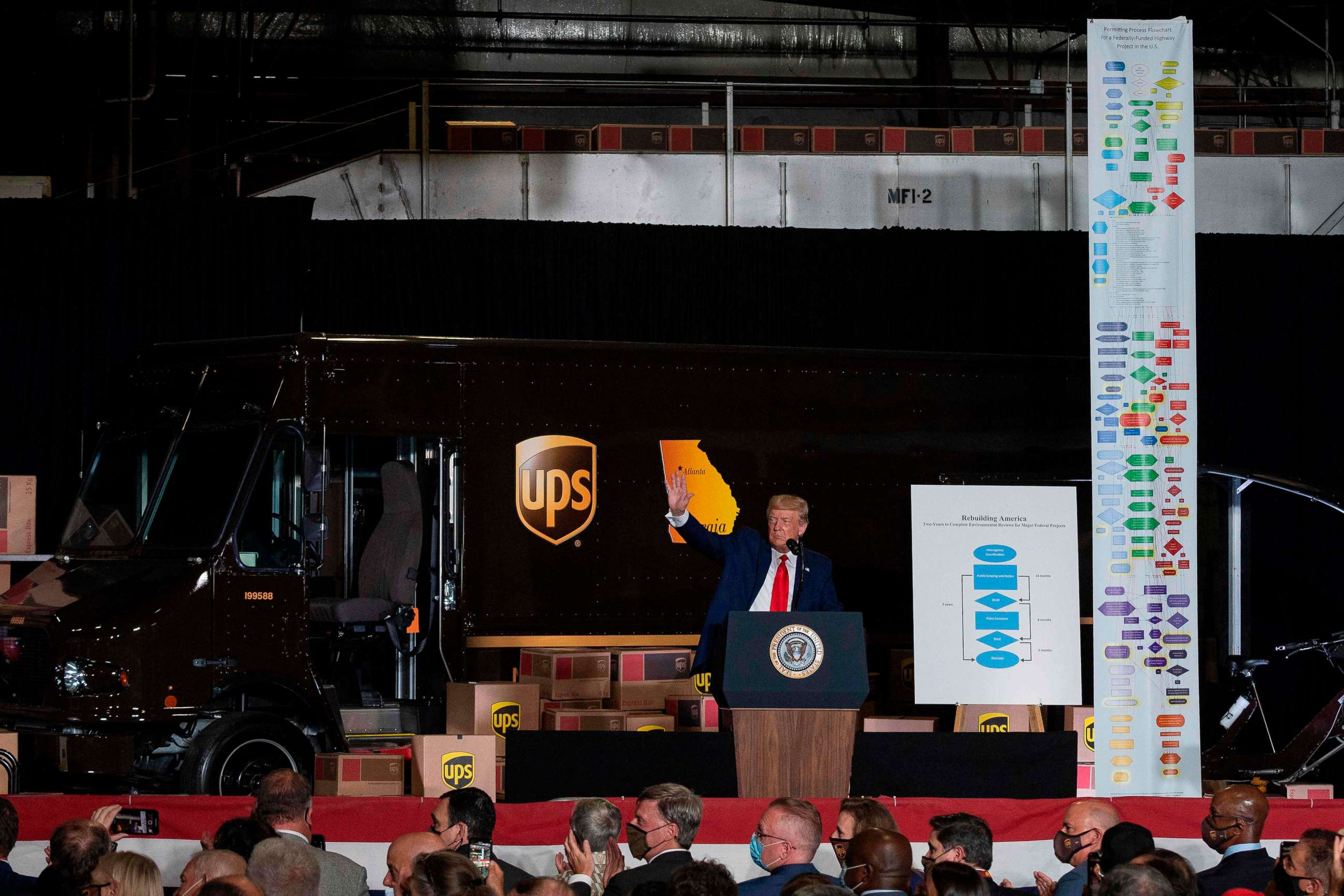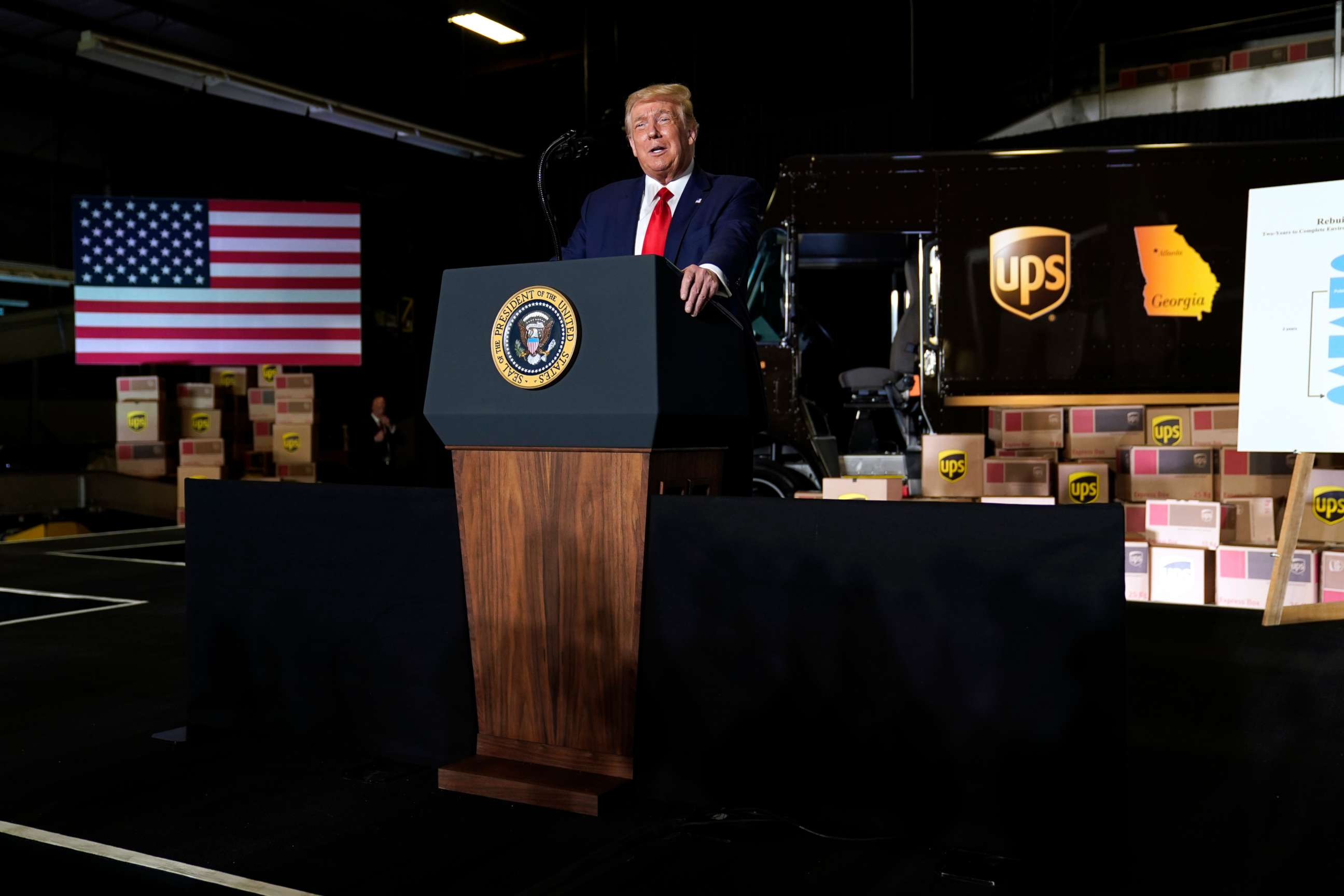Trump announces 'top to bottom overhaul' of major environmental law
Critics say the move could make it harder for Americans to weigh in on planning.
The Trump administration has changed a major environmental law to speed up infrastructure projects like highways and pipelines, a move critics say could also make it harder for Americans to have a voice in the planning process.
President Donald Trump announced the administration has completed a "top to bottom overhaul" of the National Environmental Policy Act, a crucial law often referred to as the "Magna Carta" of environmental policy.
"For decades the single biggest obstacle to building a modern transportation system has been the mountains and mountains of bureaucratic red tape in Washington, D.C.," Trump said Wednesday in remarks at a UPS facility in Atlanta, Georgia.
The National Environmental Policy Act is one of the first major environmental laws created in the 1960s and 70s when the country faced widespread problems with poor water and air quality. The law came about partly as a way to give citizens a voice in government projects after Black communities protested plans to demolish parts of their neighborhoods to build highways.
NEPA requires government agencies to evaluate a proposal's impact on the environment and the surrounding community and give the public an opportunity to raise concerns or propose changes to the government's plan.
"We’re doing something very dramatic. We just completed an unprecedented, I don’t want to say it's absolutely unprecedented, top to bottom overhaul, should have been done years ago, of the infrastructure approval process," Trump said Wednesday. "This approval process that has cost trillions of dollars over the years for our country and delays like you wouldn't believe. This is a truly historic breakthrough which means better roads, bridges, tunnels and highways, for every UPS driver and every citizen all across our land."

The White House said the new rule would expedite plans like a lane expansion project on I-75 that would allow for more freight and commercial vehicle traffic. But critics of the decision say they are especially concerned that it would make it harder for communities more adversely impacted by pollution -- including communities of color -- to speak up, especially as they have been hit harder by the COVID-19 pandemic.
"This is a clear attempt to silence and sideline people to make it easier for industry to pollute our communities. We will not let it stand," President and CEO of the Natural Resources Defense Council and former EPA chief Gina McCarthy said in a statement.
"People have a right to weigh in before a highway project tears up their neighborhood or a pipeline goes through their backyard. Steamrolling their concerns will mean more polluted air, more contaminated water, more health threats and more environmental destruction."
The Trump administration and many industry groups argue that NEPA has become outdated and that the process of environmental reviews, which often faces threats of litigation from environmental groups, has become too long and cumbersome. Trump signed an executive order in June allowing the administration to expedite projects as part of the economic recovery from the COVID-19 pandemic but the Council of Environmental Quality was already moving forward on more long-term changes to the law.
The changes finalized this week would set a time limit on environmental reviews for federal projects and in some cases could limit the scope of the review to focus more specifically on the impact of a project. It would also limit the comments the government needs to consider to those raising specific concerns about a plan as opposed to broader concerns about the cumulative impact of all natural gas pipelines, for example.
Experts that work on NEPA cases have pushed back on criticism that the law and outside lawsuits are to blame for the lengthy process of approving federal projects. They say part of the problem is lack of funding for projects and that federal agencies which conduct environmental reviews and review permit applications have lost funding and staff.

Still, Environmental Protection Agency chief Andrew Wheeler said delays in infrastructure projects can add to existing environmental problems, using the example of idling cars that release exhaust and pollution while they sit in traffic.
"President Trump is an infrastructure master-in chief. He knows how to get infrastructure built, he knows what the impediments have been, and the federal permitting process has been too cumbersome for people all across the country," Wheeler said in an interview with Gray TV.
"So this is about speeding up that process but doing it in a thoughtful manner that will still protect the environment."

Wednesday's announcement comes a day after former vice president Joe Biden announced a plan for a COVID-19 recovery focused on sustainable infrastructure, including $2 trillion in investment in transportation infrastructure that can withstand climate change, expanding the power sector to reduce pollution and greenhouse gas emissions and providing incentives to upgrade buildings and homes. Biden also announced a part of his plan specifically focused on providing more investment in disadvantaged communities and making environmental justice a bigger priority.
Trump said Biden wants to make the process for new infrastructure projects longer and that a Biden administration would "re-regulate" the energy economy and force businesses to close.
In response to the announcement the Biden campaign criticized Trump for "cutting corners" and ignoring science and communities calling for clean air and water.
"No one should be fooled that Donald Trump is attempting to destroy a bipartisan, cornerstone law to distract from the fact that "Infrastructure Week" never happened and never will happen as long as he is president," Matt Hill, Biden campaign spokesman said in a statement.
Environmental advocates and democratic lawmakers say the changes to NEPA are a step backward in the efforts to combat longstanding systemic racism.
"Polluters have made a habit of building massive pipelines, chemical refineries, waste incinerators and other public health hazards in communities of color for generations, and the National Environmental Policy Act is one of the strongest laws we have to prevent it," Reps. Raul Grijalva and Donald McEachin said in a statement.
They added "This country is facing an environmental justice test, and President Trump has failed in a colossal way with today’s announcement."
ABC's Andy Field reports for ABC News Radio:
ABC News' Molly Nagle contributed to this report.




